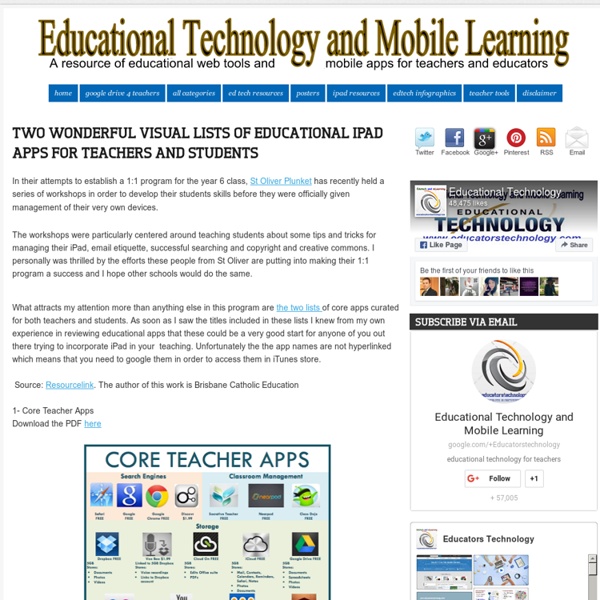Two Wonderful Visual Lists of Educational iPad Apps for Teachers and Students
In their attempts to establish a 1:1 program for the year 6 class, St Oliver Plunket has recently held a series of workshops in order to develop their students skills before they were officially given management of their very own devices. The workshops were particularly centered around teaching students about some tips and tricks for managing their iPad, email etiquette, successful searching and copyright and creative commons. I personally was thrilled by the efforts these people from St Oliver are putting into making their 1:1 program a success and I hope other schools would do the same. What attracts my attention more than anything else in this program are the two lists of core apps curated for both teachers and students. Source: Resourcelink. 1- Core Teacher Apps 2- Core Student Apps
Related: emviv
Creative writing tips for teachers: ideas and activities to inspire your class | Teacher Network
Engaging children and encouraging them to write has become increasingly difficult in the classroom. My children are bombarded with interactive and visual images constantly through the media and the internet and, as their teacher, it has become much harder for me to compete. Who wants to read or write an emotional descriptive piece when they can be fully immersed in this feeling through interactive game play? This challenge has led me to look at how I can use these media, and more dynamic approaches, to engage children in wanting to use their literacy skills and to hook them into becoming creative and thoughtful writers. Using video One way which is sure to engage children is through the use of video, in particular TV and film. For example, with my year 3 class I used the Jason and the Argonauts films to help them to explore the key features of the myths and legends genre. Non-fiction can be dealt with equally as well. Real life experience Cross curricular writing Adding drama
Simple Past
Exercises on Simple Past The simple past expresses an action in the past taking place once, never, several times. It can also be used for actions taking place one after another or in the middle of another action. Form of Simple Past For irregular verbs, use the past form (see list of irregular verbs, 2nd column). For regular verbs, just add “ed”. Exceptions in Spelling when Adding ‘ed’ Use of Simple Past action in the past taking place once, never or several times Example: He visited his parents every weekend. Signal Words of Simple Past yesterday, 2 minutes ago, in 1990, the other day, last Friday If-Satz Typ II (If I talked, …) Exercises on Simple Past Tests Simple Past: Level 1, Level 2, Level 3 Grammar in Texts Comparison with other Tenses
Today in class #6, le magazine 100% gratuit et digital
Le sixième numéro de Today in class, le magazine des professeurs d’anglais, est paru ! 100 % gratuite et numérique, la revue Today in class vous tient informé(e) de l’actualité de votre discipline au collège comme au lycée ! Vous pouvez feuilleter en ligne le sixième numéro ou le télécharger directement sur votre ordinateur, mobile ou tablette ! Au sommaire de ce numéro : le Super Bowl aux États-Unis, l’histoire de la Saint-Valentin, un quiz sur les parcs nationaux américains, la cérémonie des Oscars, le site Wordart pour créer des nuages de mots. Lire la revue Télécharger la revue Vous souhaitez lire les autres numéros ?
Lesson 37: Let's Agree to Disagree
Download Lesson 37 Speaking Pronunciation Conversation Anna: You know, I am from the country and sometimes I miss it. Dr. Anna: Excuse me. Sarah: No. Anna: Thank you. Phil: Yes, that's mine. Anna: Are you okay? Phil: Well, this is my first visit to Washington, D.C. Anna: I am from the country too! Phil: So, do you like living in the country or in the city? Anna: I like to live in the city. Phil: Why? Anna: The city is exciting! Phil: Well, I agree. Anna: I disagree. Phil: That's another thing that is different. Anna: Well, I agree. Phil: That's a good point. Anna: Look at me. Phil: But you are from the country. Anna: I have an idea. Phil: What? Anna: Well, if we say "hello," maybe they will say "hello" to other people ... Phil: ... and they will say "hello" to more people! Anna: Come on. Anna: We don't have to agree with people. Listen to short videos and test your listening skills with this quiz. Quz - Lesson 37: Let's Agree to Disagree! Start the Quiz to find out
Related:



